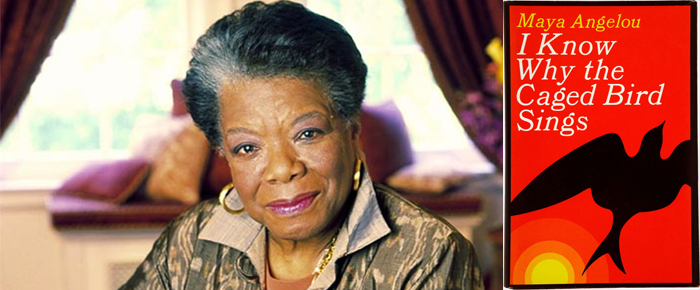
By Heidi Simmons
Some people may only know Maya Angelou as a poet. When in fact, with more than 35 books published, only a dozen are poetry. Although, to call Angelou a poet may be the very absolute truth about this remarkable woman. Her very existence was one filled with a quality of beauty, intensity, emotion and ideas.
Angelou was a creative spirit and a genuine force of nature. Her life was one of seeking a creative outlet in a world that constantly challenged her. With the odds against her, she grabbed life and spun it by the tail never allowing the debris field to get in her way.
Born in Stamp, Arkansas, Angelou’s given name was Marguerite Annie Johnson. As little girl, she and her brother first lived with their folks in San Diego until her mother could no longer handle the noise and commotion of small children and sent them to live with their paternal grandmother. When the South become too dangerous for the rambunctious Black teens they were sent back to San Diego. At thirteen, Maya was already nearly six feet tall. She felt ugly, awkward and unlovable.
The young Angelou was raped by her stepfather. She testified against him. When the man was mysteriously beaten to death, Angelou realized how powerful words were and she stopped talking.
Her mother Vivian was an entrepreneur and became a skillful businesswoman in San Francisco. When Angelou wanted to do something, like be a trolley conductor because she loved the uniform, her mother showed her how to get what she wanted. Angelou was the first woman and black person to get the job as conductor.
In San Francisco, Angelou became enamored with a popular local boy. Their singular encounter got her pregnant. She had a son and named him Clyde Bailey Johnson, calling him Guy. He was her only child.
In 1949, Angelou married a white man named Tosh Angelos. After they divorced she adapted her name to Angelou.
Angelou had many careers. She was an artist, a singer, an actress, a playwright, a director, an activist and a mother. She worked with Malcolm X and Martin Luther King. She lived in Europe and Africa. Angelou pursued everything she thought was important and worthy — opportunities that made her feel alive. She was the first black woman in many things, but it was not something on her to-do list, rather her zest for life.
At a dinner party in New York, it was suggested that she write her astonishing story. In 1969, she wrote her first book, I Know Why the Caged Bird Sings, a memoir of her life up to the age of 17. It was considered a new form of autobiography – a personal and intimate experience told boldly and without shame. Six more autobiographical books followed.
Today, I Know Why the Caged Bird Sings is on high school reading lists around the globe. But in 1969, the book was considered too explicit. A narrative with sex, violence, lesbianism, irreverent religious depictions and premarital cohabitation, the book still remains on the Library Associations list of 100 Most Frequently Challenged Books.
When you think of Angelou, it is easy to hear her mellifluous, resonant voice. She won three Grammy Awards for her spoken word albums.
In 2013, her last book Mom & Me & Mom, Angelou wrote about the intimate relationship between a mother and daughter and the surprisingly powerful influence it had on her life and the way it shaped her identity. She wrote about what touched her life, not just as a black woman, but as a human being. Everything that she faced she considered with dignity and grace. She would be the first to admit mistakes and also the first to own them. She was not out to make a point but out to make a life.
The beauty in Angelou’s work is that her world is rich with description. Although she detailed her experience as a black woman, her characters are very familiar people –- and, in a way — colorless. As a black woman, what other story could she tell? Her prose are not hostile or vindictive, but rather sensitive, honest and lyrical. We meet the good and the bad, the mean and the generous people who crossed paths with Angelou, all leaving their mark on a woman big enough to take it and move on to find her peace and joy.
Angelou was honored and awarded by presidents and organizations not only because of what she accomplished, but because of who she was—resilient and beautiful inside and out. Angelou’s whole life was poem of great beauty. Rest in peace.










































